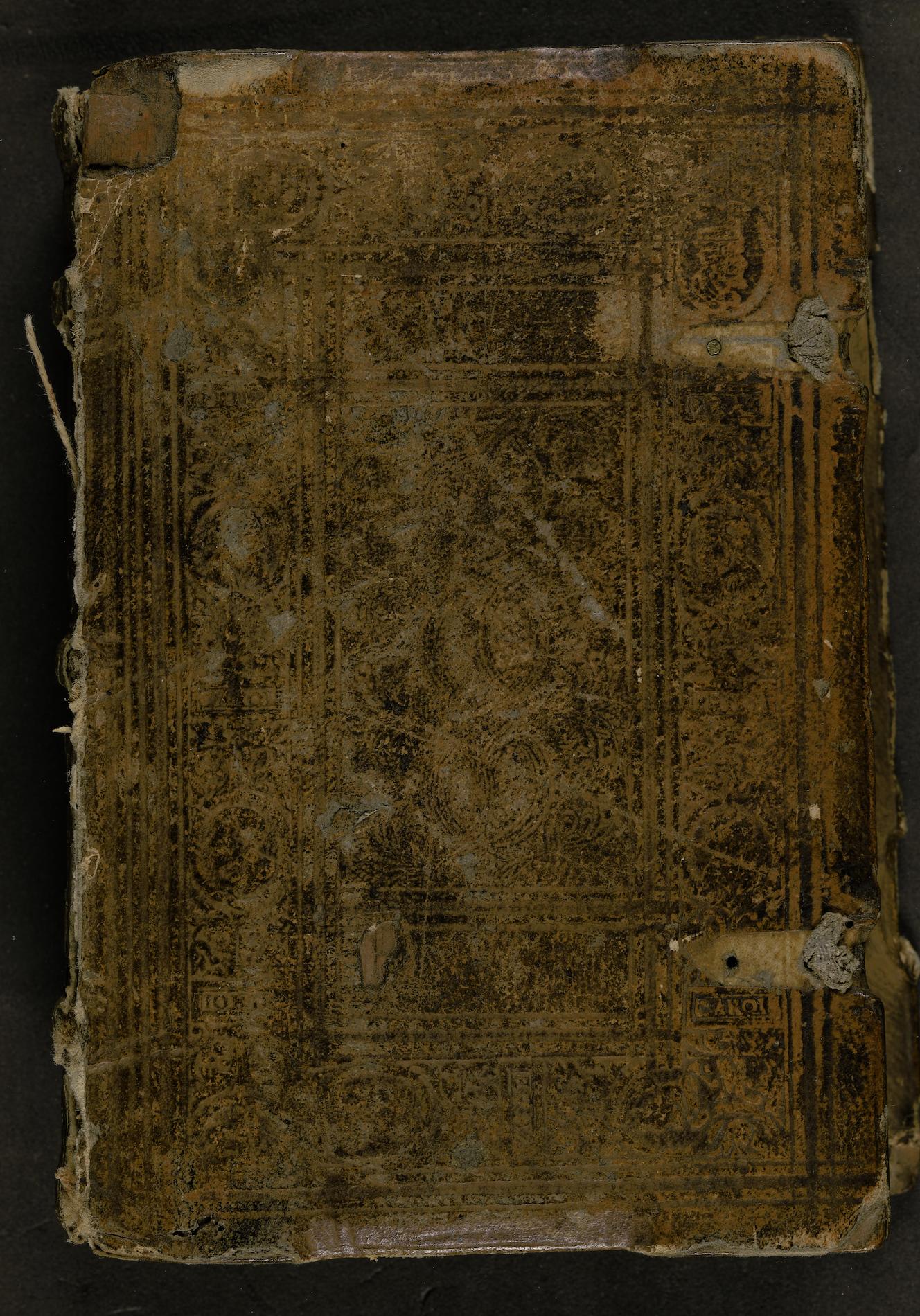Richard C. Kessler Reformation Collection
The Richard C. Kessler Reformation Collection was established in 1987, when Richard and Martha Kessler donated their private collection of Reformation imprints and manuscripts to Emory University. These materials were combined with Reformation holdings at the Pitts Theology Library, and an effort was launched to enlarge and sustain this collection in the years to come. An advisory committee of Lutheran laypersons and clergy and of Candler School of Theology faculty and administrators oversees the nurture of the collection and its programs. The Reformation Notes newsletter provides semiannual updates on the growth of the collection, and the Reformation Day at Emory program of music and lectures each October celebrates the collection and its contributions to music, history, and theology. In the sixteenth century the social and theological movements of central Europe, known collectively as the Reformation, critically shaped religion, law, education and other institutions in the West, and their long shadow has extended even to the present. The purpose of the Kessler Collection is to document these changes by collecting print and manuscript materials down to 1570 by Martin Luther (1483-1546) and those whom he influenced or engaged in debate. In this way historians and theologians will be able to hear the full range of voices that were raised in this dynamic period. The holdings of the collection now exceed 4,000 items, a mark approximated by only two other libraries in North America; no American library approaches the Kessler Collection's 1,000+ publications by Luther himself.
-
 Text
TextEyn bett buchlin. : Der czehen gepot. Des glaubens. Des vater vnsers. Des Aue Marien. Etliche verdeutschte Psalmen. Die Epistell sanct Pauls tzu tito, eyn Christlich leben tzu vnterrichten
Luther, Martin, 1483-1546Summary: Text in German includes Luther's translations from Latin of several Psalms from the Hebrew O.T., and the Epistle to Titus from the Greek N.T. -
 Text
TextEthnica Iesvitarum doctrina de duobus praecipuis Christianae fidei articulis, : nempe de expiatione remissioneq[ue] peccatorum: ac de iustificatione aut iustitia Christi, qua Christiani iustificantur: ex eorum autentico, magnisq[ue] bullis confirmato Catechismo, ad verbum descripta ...
Flacius Illyricus, Matthias, 1520-1575Summary: Peter Canisius was a Dutch Jesuit working to restore the Catholic church in Germany during the Reformation. Matthias Flacius criticized Canisius's catechism, first published in 1555. In this tract, he specifically attacks the Jesuit's views on the expiation of sin and the justification in Christ. -
 Text
TextErotemata dialectices : continentia ferè integram artem : ita scripta, ut iuuentuti utiliter proponi possint
Melanchthon, Philipp, 1497-1560Summary: First printing of Melanchthon's third and final textbook of dialectic. -
 Text
TextEpistola apologetica Matthiae Flacij Illyrici ad quendam Pastorem : Item Duo Somnia Philippi
Flacius Illyricus, Matthias, 1520-1575Summary: Open letter to an anonymous pastor justifying Matthias Flacius' opposition to the Leipzig interim, and Melanchthon's willingness to compromise with the Catholic Church on matters of liturgy. -
 Text
TextEnchiridion : Der kleine Catechismus für die gemeine Pfarherr vnd Prediger
Luther, Martin, 1483-1546Summary: Second illustrated edition of Valentin Babst's publication of Luther's small catechism. -
 Text
TextEnchiridion : Der kleine Catechismus : Für die gemeine Pfarherr vnd Prediger
Luther, Martin, 1483-1546Summary: A 1565 printing of Luther's Small Catechism. -
 Text
TextEnarratio Psalmi Sexagesimi octavi, Exvrgat Deus & dissipentur inimici eius &c.
Major, Georg, 1502-1574Summary: Interpretation of Psalm 68 by Georg Major, a student of Luther and Melanchthon, and professor at Wittenberg from 1536, with a few brief interruptions, until his death. -
 Text
TextEine Trostpredigt : das die im Herren entschlaffen, mit reuden wider zusammen kommen, vnnd eines das ander nach der Aufferstehung kennen wird, vnnd die seligen in ewiger Freud, vnd englisch Keuschheyt, vnd himlischer Freundschafft bey einander bleiben werden. Auss dem Euangelio von der Witwen Sone zu Naim
Mathesius, Johann, 1504-1565Summary: A sermon by Johann Mathesius on the resurrection of the dead, preached three hours before his own death. Issued with it is the funeral sermon for Mathesius, delivered by Caspar Franck. -
 Text
TextEin einfeltige Weise zu beten, für einen guten Freund
Luther, Martin, 1483-1546Summary: 1545 printing of a work by Luther on intercessory prayer, first published in 1535. -
 Text
TextEin Betbuchlein, für allerley gemein anligen, einem jeden Christen sonderlich zu gebrauchen
Summary: Early edition of a Lutheran prayer-book. -
 Text
TextEechte ware vnd christliche Auslegung vber die Wort des Herrn Johannis am 16 : Jch geh zu meinem Vater, vnd ir sehet mich fort nicht mehr. Wider die newen Ketzerey, die, die göttlichen Gerechtigkeit, vnsers Herrn Jhesu Christi verwirfft, vnd verlestert, als sey sie nicht, durch den Glauben vnser, vn[d] jn vns
Osiander, Andreas, 1498-1552Summary: Short tract by Andreas Osiander about John 16 (Jesus going to the Father) and the doctrine of justification. -
 Text
TextDer Todt ein Endt, aller Yrdischen ding
Sachs, Hans, 1494-1576Summary: In this "New Year's Wish," Hans Sachs considers the problem of a man facing death. He calls first upon his physical attributes--youth, beauty, strenght, etc,--but finds they cannot help him. It is the spiritual factors of Sorrow, Confession, Pepentance, Hope, Faith and above all Love, that give him good counsel and rouse him from the dream of Death. This is the second printing of the revised version. -
 Text
TextDer Kirchen zu Witteberg jr Iudicium von diesem vnserm Buch wider Osiandrum
Mörlin, Joachim, 1514-1571Summary: The only printing of a pamphlet against Andreas Osiander's interpretation of Luther's doctrine of salvation by faith, signed by several theologians and pastors from Wittenberg. -
 Text
TextDer Deudsch Psalter
Summary: The 1531 revision of Luther's German Psalter was more free and less literal than any of his previous translations. This is the first printing of this third and final edition of the German Psalter. The comittee that assisted Luther in revising this translation finished its work May 15, 1531. Printing was not completed until 1533. -
 Text
TextDemonstrationes evidentissimae XXX. praesentiae, distributionisq[ue] corporis ac sanguinis Christi in sacra coena, hactenus multis minus cognitae
Flacius Illyricus, Matthias, 1520-1575Summary: A tract by Matthias Flacius asserting the real presence of Christ in the eucharist. -
 Text
TextDe origine et autoritate Verbi Dei, et quae pontificum, patrum, et concilioru[m] sit autoritas admonitio, hoc tempore, quo iterum de concilio congregando agitur, ualde necessaria : recongnita [sic] et aucta additus est catalogus doctorum ecclesiae Dei, à mundi initio, usque ad haec tempora
Major, Georg, 1502-1574Summary: Tract on the history of Divine Revelation, tracing the teachers of the church from the Creation to the author's own time, by Georg Major, a student of Luther and Melanchthon, and professor at Wittenberg from 1536, with a few brief interruptions, until his death. -
 Text
TextDe Libero arbitrio ΔΙΑΤΡΙΒΗ, sive collatio
Erasmus, Desiderius, -1536Summary: Early edition of Erasmus' treatise on free human will and its limits. -
 Text
TextDe dialectica libri quatuor recogniti. Anno. XXXIIII
Melanchthon, Philipp, 1497-1560Summary: Melanchthon wrote three versions of his book on dialectic, considering only the third to be truly successful. This is a printing from 1534 of the second (1528) version. -
 Text
TextDas Jhesus Nazarenus der ware Messias sey : Derhalben die Juden auff kaynen andern warten dörffen
Samuel, MarochitanusSummary: German translation by Wenzeslaus Linck of Epistola contra Judaeorum, thought to be written in Arabic by Samuel of Marocco, an apostate Jew at the beginning of the 11th century and translated into Latin by the Spanish Dominican Alphonsus Bonihominis in the 14th century and widely disseminated. Bonihominis is likely the real author of the work.

